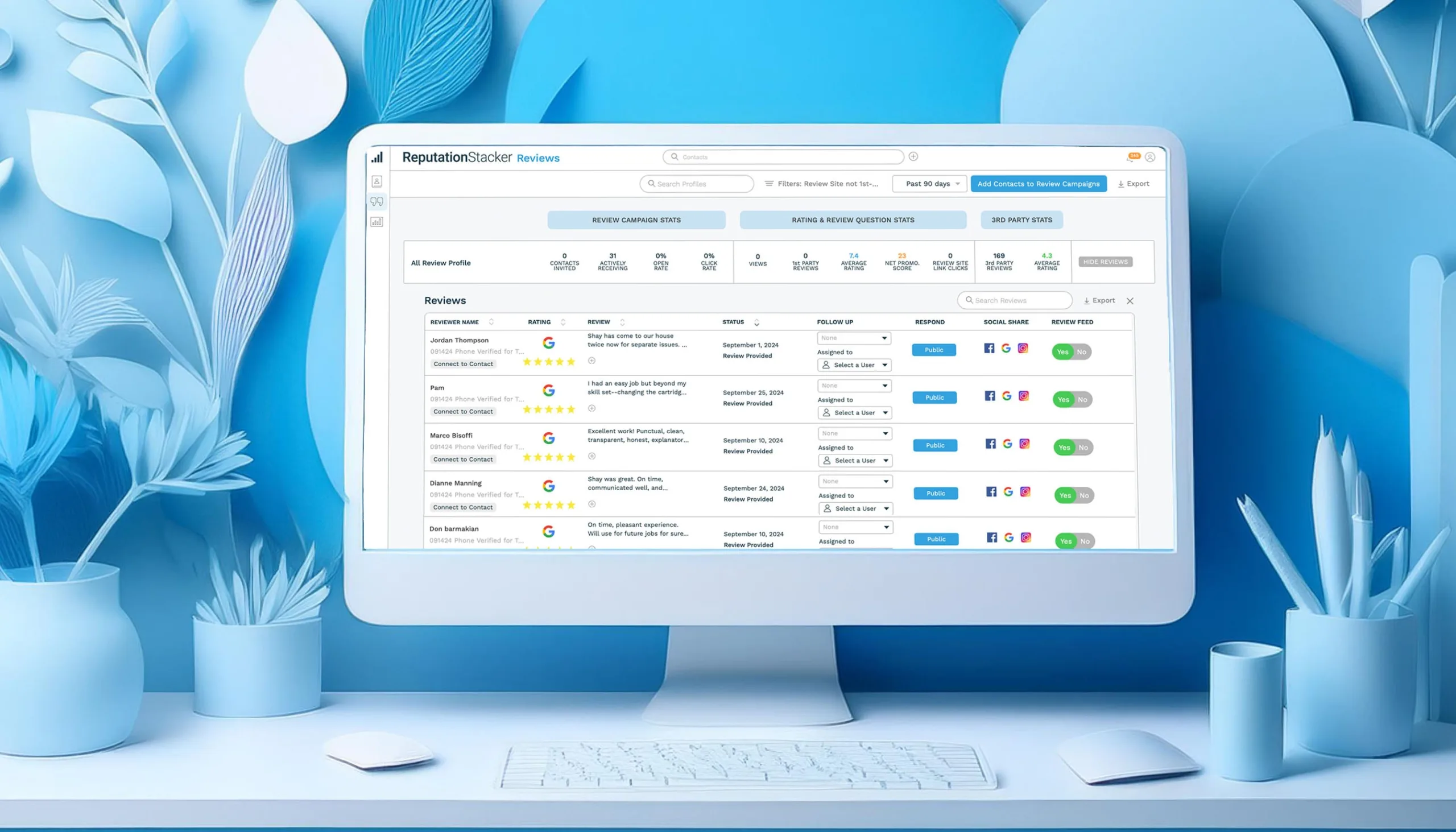These days online reputation is more important than ever.
Studies show that 98% of consumers read online reviews. Positive online reviews and a solid reputation provide enormous benefits for businesses in terms of driving new customers, increasing trust, and improving SEO.
With the proliferation of review sites like Yelp and Google, coupled with the reach of social media, a business’s online reputation has a major impact on its brand image and overall success.
72% of consumers say positive reviews make them more likely to use a business. On the other hand, negative reviews can deter customers and damage brand perception.
Managing and monitoring online reputation is crucial for businesses aiming to attract and retain customers.
Building a strong, positive online reputation has multiple benefits for businesses.
It drives new customer acquisition by establishing trust and social proof.
It improves SEO by boosting engagement metrics and keywords rankings.
It also increases customer loyalty and retention by providing existing customers with confidence in their purchasing decisions.
In short, having a strong online reputation management strategy is now a key part of succeeding as a business. By actively getting reviews & responding to them and interacting with customers on social channels, your business can thrive.
What is Online Reputation Management?

Definition and Importance
Online reputation management (ORM) is the practice of monitoring, influencing, and maintaining the public perception of a business or individual on the internet.
It involves review management, social media engagement, and other digital content that can impact a brand’s reputation.
Your customers rely heavily on online information when making purchasing decisions.
A strong online reputation management strategy is crucial for businesses, as it can significantly influence buying decisions. A positive online reputation not only attracts target customers but also increases consumer trust, which is essential for long-term success.
7 Reasons Why Your Business Needs an Online Reputation Strategy

Building a good online reputation can take time.
It requires a dedicated strategy and the patience to maintain it, especially since businesses now need to manage their reputation across different online platforms.
But the benefits are worth it.
Put simply, having a strategy for online reputation management is the key to standing out from the competition and driving more sales.
The bonus is that more sales can lead to more happy customers who are willing to praise your business online… leading to more sales. It’s a virtuous cycle.
1. It Shows A Good Relationship With Customers
Customers need to trust a business before buying its products and services, so they look to other customers.
It’s understandable because finding unbiased information about a business is as simple as looking at real customers with first-hand experience.
Online reviews are a prime example of this.
Online reviews tell a story of how a business treats its customers, as well as display the relationship a business shares with its customers.
Customer advocacy is therefore an invaluable resource for your business.
Whether in the form of a positive review or social media endorsement, online praise from your existing customers will lead more new customers to your business and what it has to offer, contributing significantly to your online reputation.

2. It Encourages Customer Engagement
Engaging with customers is one of the best ways your business can improve its online reputation.
Building on the above point, it can also demonstrate a healthy customer relationship – something potential customers want to see.
This makes it important to interact with customers wherever possible, such as your social media channels and the review sites that are most important for your business.
This includes creating engaging social media content and responding to reviews.
The good thing about interacting with customers is that it encourages more engagement.
By seeing that your business is communicative and caring, more customers will readily interact with you and feel more inclined to endorse your business with their own user-generated content.

3. It Builds Trust And Credibility
A good online reputation will serve as your banner of trust and credibility.
A high star rating backed by a steady stream of recent positive reviews can be more than enough to persuade a potential customer to skip further research and head straight to your store or website to buy the product or service they’re after.
In an age of accessible information, trust and credibility are factors that will make your business stand head and shoulders above the rest. And building a good online reputation and building trust are virtually the same thing these days.

4. It Increases Employee Loyalty
Alongside customer reviews, review platforms such as Glassdoor invite employees to rate and review the companies they work for.
This is a whole new side of reputation management your business needs to account for, as it is reflective of how you treat your employees.
Employer reviews now play a big role in determining whether or not jobseekers choose to apply for your company.
Customer reviews, on the other hand, can also determine whether or not existing employees remain loyal to your business, as what your customers say can have an effect on whether your employees feel they are making a difference and are part of a business that cares.

5. It Helps Your Business Improve
A good online reputation can increase sales, which can increase reviews.
And with more reviews the more valuable insights you will have into what your business is doing right and what it needs to do to improve.
No business, small or large, should rest on its laurels.
Businesses should always be looking for ways to grow and innovate, and your customers’ opinions are by far the most valuable form of feedback your business can receive.
This doesn’t just make it important to listen to your customers but also to encourage your customers to say what they think via customer feedback surveys, social media content, and online reviews.
Using an online reputation management tool like ReputationStacker can help you get more reviews, then gather & analyze them to determine exactly what you can do today to improve your business.

6. It Helps In Information Search
Having a good online reputation is vital for information search: the second step of the buyer decision process is when a consumer searches for a business, product, or service after recognizing a need or want.
It’s during this stage that consumers do their research, weigh pros and cons, and refer to credible information sources such as customer reviews before making an informed decision based on trust and confidence.
As a result, having a credible, authoritative online reputation will not just draw customers to your business but speed up the buyer decision-making process.
After all, the sooner a customer trusts your business, the sooner they will buy what you have to offer.

7. It Boosts Sales
A good business reputation is what generates sales.
This is the main reason your business needs an online reputation management strategy and the end result that all the above reasons will lead to.
But more sales are not the only benefit of building a good online reputation.
As touched on earlier, more sales can lead to more reviews, which can create a powerful feedback loop that can influence more customers to use your business.
The result is that your online reputation will start to grow by itself.
The driving force here is customer reviews, as reviews will increase sales by inspiring trust and confidence. So the bottom line is clear: businesses need reviews for online success.

Factors that Impact Online Reputation
Reviews
Review sites and social media platforms play a significant role in shaping a business’s online reputation.
Positive reviews on review sites like Yelp, Google, and industry-specific sites can build trust and credibility with potential customers.
These reviews serve as social proof, showing that others have had good experiences with your business.
On the other hand, negative online reviews can significantly damage a business’s reputation if left unattended. It’s crucial to respond to negative reviews promptly and professionally to mitigate their impact.

Social Media
Social media platforms offer a dynamic space for customer interaction.
Engaging content, positive comments, and responsive customer service contribute to a positive online reputation via your social channels.
Regularly posting engaging content and interacting with followers can help build a loyal community around your brand. However, negative comments or complaints left unaddressed can paint a negative picture of your business.
It’s essential to monitor your social media accounts and address any negative feedback promptly to maintain a positive online reputation.
Monitor Your Reputation

Keeping tabs on your online reputation is crucial.
You’ll want to monitor review sites, search engine results, and set up alerts to stay on top of what customers and leads are seeing about your brand.
Set up Google Alerts for your business name, keywords, and variations of your name. Google Alerts will email you whenever new web pages or articles mention your business. Checking these alerts regularly allows you to stay on top of what’s being said about your business online.
Keep an eye on major review sites like Google, Yelp, Facebook, and industry-specific directories. Be sure to claim and optimize your listing on these sites so you can monitor reviews and respond as needed.
Consistent monitoring provides visibility into how your reputation is evolving online. While staying on top of reviews takes time, it enables you to capitalize on positive feedback and address issues before they spiral out of control.
And if you want to automate all of this, you can use reputation management software like ReputationStacker to do the heavy lifting for you.
Get Positive Reviews

One of the best ways to get more positive reviews is to directly ask your customers for them.
An easy way to do this is by sending a follow up email after a purchase or service, and include a friendly ask to leave an online review.
Let them know you appreciate their feedback and that it helps other potential customers learn about your business.
The closer the request is to the actual customer experience, the more likely they will be to leave a review.
You can also incentivize customers to leave reviews by offering a discount, coupon or other reward in exchange for their feedback.
Just make sure to follow the review site’s guidelines around incentives. For example, most review platforms and the FTC require that if you offer the same incentive to anyone who writes a review, regardless of if it is a positive review or negative review, and that the review mention the incentive.
Deal with Negative Reviews

No business wants to get negative reviews, but they’re inevitable from time to time.
The key is responding professionally and trying to make amends when appropriate.
Take a deep breath when you receive a negative review. Respond calmly and avoid getting defensive.
Thank the customer for their feedback and apologize for their poor experience. Offer a solution if possible. For example, if they complained about an employee, you could explain the specific additional training you’ll be giving that employee to make sure it doesn’t happen again.
If the review seems fake or intentionally malicious, you can try to get it removed.
Most review platforms let businesses report reviews that violate their rules. Use this strategy sparingly, as aggressive flagging can damage your reputation on the site.
Most importantly, learn from negative reviews.
If multiple people complain about the same thing, it’s a clear sign something needs to improve with your business. Reviews provide an opportunity to address issues and offer better service going forward.
Need help responding to bad reviews? Check out our negative review response examples.
Key Takeaways

Here are the key takeaways from these strategies for improving your online reputation:
Monitor review sites and search engine results regularly.
Be active on social media by responding to customers, sharing news, and posting engaging content.
Proactively request reviews from all of your customers.
Deal with negative reviews professionally.
It’s crucial to monitor your online reputation regularly so you can catch any new reviews, press mentions or search engine results right away.
This practice allows you to respond quickly to reviews and encourage more positive mentions.
Ongoing monitoring enables you to continually refine and improve your strategies over time. The online landscape is always shifting, so staying on top of your reputation management is key for your business.
The Best Online Reputation Management Strategy: Get More Reviews

You can’t build an impressive online reputation without a strategy.
But creating an online reputation strategy isn’t as difficult as you might think
The highest leverage activity you can do to continuously improve your online reputation is to get more reviews.
And the easiest way to get more reviews is to use automated reputation management software like ReputationStacker.
ReputationStacker is effective because it streamlines the review process from start to finish.
The result is that it makes it easier than ever for customers to post reviews, making it easier than ever for your business to receive them.
As we have explored, managing and improving your online reputation should be a top priority for any business. The strategies covered in this guide, from actively monitoring review sites to transparently addressing feedback, provide a blueprint for taking control of how potential customers perceive your brand online.
By routinely keeping tabs on what people are saying, and taking proactive steps to share positive news while also righting any wrongs, you can cultivate an outstanding reputation that encourages new business.
While reputation management requires constant vigilance and effort, the payoff for diligently following these best practices is immeasurable.
Frequently Asked Questions About Online Reputation Strategy
What is an online reputation management strategy?
An online reputation management strategy is a systematic approach to improving and maintaining a business’s online reputation through monitoring, response, and proactive content creation.
How can online reputation management benefit my business?
Implementing an effective online reputation management strategy can improve your business’s image, enhance customer experience, and create a competitive advantage in the market.
What tools are available for online reputation management?
There are various online reputation management tools and reputation management software like ReputationStacker that help businesses monitor and manage reviews, and analyze customer feedback.
How do social media platforms impact a brand’s online reputation?
Social media can amplify both positive and negative comments. Engaging with your audience authentically can improve your brand’s online presence.
What should I do about negative reviews?
Address negative reviews promptly and professionally. Use them as an opportunity to improve your business’s reputation and customer experience.
How can I improve my brand’s image online?
Focus on positive media coverage, actively manage negative feedback, and ensure that your online content reflects your brand’s tone and values.
What role do search engines play in online reputation management?
Search engines significantly influence how your brand is perceived. High search rankings for positive content can improve your business’s reputation and customer trust.
How can I monitor brand mentions online?
You can use social media monitoring tools and online reputation management tools to track mentions across various platforms and respond in a timely manner.
How do I handle negative comments on social media?
Respond to negative comments professionally, address the issue, and move the conversation to a private channel if necessary. This demonstrates good customer service and care.

How does reputation management relate to digital marketing?
Reputation management is an integral part of digital marketing, as it affects brand image, consumer trust, and engagement across online channels.
How can I get my customers to write reviews?
To get reviews, you have to ask for them. Send review requests through email or direct communication, emphasizing the importance of their feedback for your business’s reputation. Automated reputation management software like ReputationStacker can handle this for you.
What are the factors that contribute to a strong brand reputation?
Factors include positive customer experiences, effective handling of negative feedback, consistent messaging, and active engagement in online communities.
How does search engine optimization (SEO) affect online reputation?
SEO helps improve the visibility of positive content on search engine results pages, which can improve your brand reputation and counter negative online reviews.
What is brand safety, and how does it relate to online reputation?
Brand safety involves protecting your brand from negative associations and ensuring that your online presence is managed to avoid harmful content.
How can local businesses manage their online reputation effectively?
Local businesses can manage their online reputation by focusing on getting positive reviews, managing local business listings, and engaging with their community through social media.
What is the impact of online conversations on a brand’s reputation?
Online conversations can shape public perception, making it crucial to engage positively and address concerns promptly to maintain a strong brand reputation.
How can I use news articles to enhance my brand’s reputation?
Getting positive media coverage through news articles can significantly improve your brand’s image and trustworthiness, contributing to your overall online reputation management strategy.

